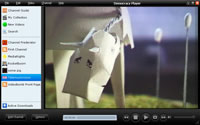 As if you don’t already spend enough time looking at your computer, the folks at Democracy would like to introduce you to the delights of free Internet TV.
As if you don’t already spend enough time looking at your computer, the folks at Democracy would like to introduce you to the delights of free Internet TV.
Democracy have just launched the latest upgrade to their open-source TV application, Democracy Player. The player offers downloads from over 300 channels of Internet video and provides RSS support, an auto-download feature and integration with Bittorrent. Democracy Player is available for Windows, Mac and 3 different flavours of Linux (Ubunu, Debian and Fedora).
The player is a breeze to use. We tested the Mac version and it looks and feels just like a well written Mac app. Functions are intuitive and smooth and there’s more than a hint of iTunes about the interface. Locating videos is easy. You can browse the 300 channels via the channel guide, select from the latest popular material, run a search or add your own videos. Having located your video just double click the item to download to your computer and sit back as Democracy Player runs it in full screen mode.
For those interested in making their own videos, Democracy also offers Broadcast Machine, an application allowing you to set-up channels and RSS feeds as well as enabling video uploads, all from your own Website.
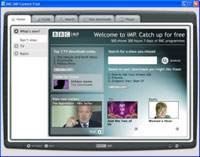 Democracy is a not-for-profit organisation dedicated to the principal of free, open access to media through the use of open-source software.
Democracy is a not-for-profit organisation dedicated to the principal of free, open access to media through the use of open-source software.
While Democracy focuses on free content, moves towards commercial Internet TV services are proceeding apace. Last week Channel Four announced its intention to launch a video-on-demand service based on ‘closed’ channels such as cable, BT Broadband and the Internet. The service will include a film download service offering movies typical of the channel’s soon-to-be free FilmFour movie channel. There will also be a wide range of other material including Channel 4 shows and pay-for content from the archives. In addition Channel Four is expected to start online streaming of its own content (films and US exports expected) in the very near future.
![]() Not to be out done, the BBC proposes to launch its iPlayer (previously named iMP – Interactive Media Player) service in two versions; a free service offering a seven-day catch-up for all its TV and radio output and a commercial version offering archived versions of programmes.
Not to be out done, the BBC proposes to launch its iPlayer (previously named iMP – Interactive Media Player) service in two versions; a free service offering a seven-day catch-up for all its TV and radio output and a commercial version offering archived versions of programmes.
Elsewhere Apple continues to develop iTunes with Steve Jobs in serious talks with Hollywood studios about making movies available over the service. This may well prove to be an insurmountable challenge, given the movie industry’s scattershot approach to electronic licensing, distribution and DRM.
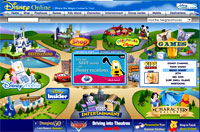 Purveyor of fluffy, family-friendly feature films, Walt Disney has become the latest Hollywood studio to offer movies for sale on the Internet, with a new service offering films via the CinemaNow online service.
Purveyor of fluffy, family-friendly feature films, Walt Disney has become the latest Hollywood studio to offer movies for sale on the Internet, with a new service offering films via the CinemaNow online service.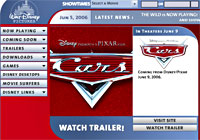 Instead, the movies can only be copied to a total of three other devices (including laptop PCs and handheld electronic devices) supporting CinemaNow’s copyright-protection technology.
Instead, the movies can only be copied to a total of three other devices (including laptop PCs and handheld electronic devices) supporting CinemaNow’s copyright-protection technology.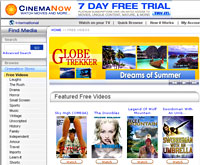 “We take that as a real nice vote of confidence,” he added, before trotting off to the litter tray.
“We take that as a real nice vote of confidence,” he added, before trotting off to the litter tray. Homechoice have just done a Video on Demand (VoD) deal with CNN to carry their content. It’s the first VoD deal that CNN International have done, meaning the first outside the US.
Homechoice have just done a Video on Demand (VoD) deal with CNN to carry their content. It’s the first VoD deal that CNN International have done, meaning the first outside the US. CNN, like many other content creators are starting to ramp up their alternative channels for output, thinking beyond the POTV (Plain Old TeleVision). Last week they announced a deal with Telewest to deliver an interactive text-based version of the CNN news service.
CNN, like many other content creators are starting to ramp up their alternative channels for output, thinking beyond the POTV (Plain Old TeleVision). Last week they announced a deal with Telewest to deliver an interactive text-based version of the CNN news service. It comes as no surprise to the more cynical amongst us, but MySpace is set to offer downloadable digital content for sale from its sister company, Fox.
It comes as no surprise to the more cynical amongst us, but MySpace is set to offer downloadable digital content for sale from its sister company, Fox. To entice users to fork out for the full service, Burger King will be offering free downloads of each of the first episodes from series one and five of ’24’
To entice users to fork out for the full service, Burger King will be offering free downloads of each of the first episodes from series one and five of ’24’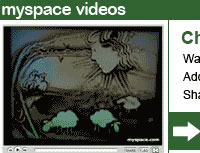 The Burger King/Fox/MySpace love-in reflects the growing power of MySpace as a new distribution platform and advertising magnet, leading Bambi Francisco of MarketWatch to wonder what might happen if MySpace developed a
The Burger King/Fox/MySpace love-in reflects the growing power of MySpace as a new distribution platform and advertising magnet, leading Bambi Francisco of MarketWatch to wonder what might happen if MySpace developed a  Sky News are very proud of what they’re billing as the Highest Ever Video News Podcast (or HEVNP to all of you acronym manufacturers out there).
Sky News are very proud of what they’re billing as the Highest Ever Video News Podcast (or HEVNP to all of you acronym manufacturers out there). What kit to take to Everest?
What kit to take to Everest? The video is being shot on two cameras, both Sony’s, the HVR-Z1, or Z1 as it’s know in the trade and the HVR-A1 (A1), having the advantage that it’s really small – pretty useful when you’re having to lug it up Everest.
The video is being shot on two cameras, both Sony’s, the HVR-Z1, or Z1 as it’s know in the trade and the HVR-A1 (A1), having the advantage that it’s really small – pretty useful when you’re having to lug it up Everest.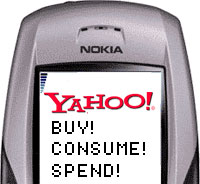 Yahoo have released a report with communications company OMD today that looks into how the Internet influences peoples shopping habits. Not surprisingly it covers online purchases, but far more interesting is how people are using the Internet and other technology to inform their ‘real-world’ purchases.
Yahoo have released a report with communications company OMD today that looks into how the Internet influences peoples shopping habits. Not surprisingly it covers online purchases, but far more interesting is how people are using the Internet and other technology to inform their ‘real-world’ purchases.
 Having come from a communications agency, this report, “Long and Winding Road: The Route to the Cash Register”, won’t surprise you in using all sorts of language in a way that hasn’t ever been seen in English before. They’ll also grab hold of words that you have heard before and use them to create comfortable categories. Oh and tell you things that really are patently obvious but wrap them up in a different way ….
Having come from a communications agency, this report, “Long and Winding Road: The Route to the Cash Register”, won’t surprise you in using all sorts of language in a way that hasn’t ever been seen in English before. They’ll also grab hold of words that you have heard before and use them to create comfortable categories. Oh and tell you things that really are patently obvious but wrap them up in a different way ….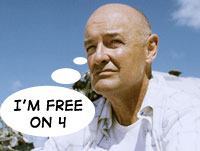 Channel 4 is offering a UK online exclusive of the entire first series of the cult hit show, Lost.
Channel 4 is offering a UK online exclusive of the entire first series of the cult hit show, Lost. You’ll have to be quick to watch the new series online though, as episodes one and two will only be free to view for two weeks (until May 11th 2006.)
You’ll have to be quick to watch the new series online though, as episodes one and two will only be free to view for two weeks (until May 11th 2006.)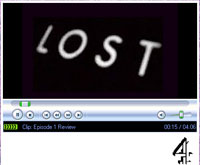 Obsessive fans hoping to work out the dark complexities of the series by analysing each show in infinite detail will be disappointed to learn that it’s only possible to watch episodes for a 24 hour period on a single PC before the pesky thing goes into auto-destruct,
Obsessive fans hoping to work out the dark complexities of the series by analysing each show in infinite detail will be disappointed to learn that it’s only possible to watch episodes for a 24 hour period on a single PC before the pesky thing goes into auto-destruct,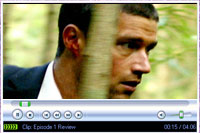 Lost video is only available to UK users using Windows Media Player 10 or above.
Lost video is only available to UK users using Windows Media Player 10 or above. Entertainment behemoths Walt Disney are planning on making hit TV shows like “Desperate Housewives” and “Lost” available as free Internet downloads in an initiative to haul in new advertising revenues.
Entertainment behemoths Walt Disney are planning on making hit TV shows like “Desperate Housewives” and “Lost” available as free Internet downloads in an initiative to haul in new advertising revenues. With digital video recorders like TiVo letting slogan-weary viewers fast-forward past the endless onslaught of adverts seen in the US, TV broadcasters are desperately trying to find ways to keep the advertising revenues rolling in.
With digital video recorders like TiVo letting slogan-weary viewers fast-forward past the endless onslaught of adverts seen in the US, TV broadcasters are desperately trying to find ways to keep the advertising revenues rolling in. Punch ups in Disneyland
Punch ups in Disneyland